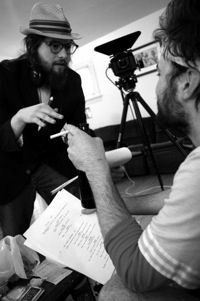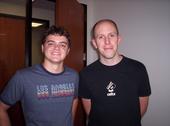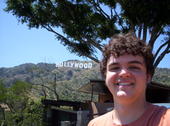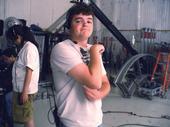In 2007, I asked Adam Davis, a young alum from Drake University, to write about his first year [starting out in Hollywood](http://johnaugust.com/archives/2007/starting-out-in-hollywood). He’s back with a follow-up.
——————-
![]() As of a few weeks ago, I’ve been living, working, and scraping by in Los Angeles for two years. Looking back is an interesting thing, because for me it all seems more daunting after the fact. It brings up thoughts of “Wow, I got to work on that?”, “Gosh, was I naive,” or “I put up with that for how long?” Some of the jobs I’ve had have been badges of honor, others, badges of courage. But everything, good and bad, has been a master’s course in the film industry and life.
As of a few weeks ago, I’ve been living, working, and scraping by in Los Angeles for two years. Looking back is an interesting thing, because for me it all seems more daunting after the fact. It brings up thoughts of “Wow, I got to work on that?”, “Gosh, was I naive,” or “I put up with that for how long?” Some of the jobs I’ve had have been badges of honor, others, badges of courage. But everything, good and bad, has been a master’s course in the film industry and life.
 So where did I leave off in the last post? Ah, an indie film, fifty dollars a day. After that I jumped on to another project as a set PA, a beach volleyball movie which shot, appropriately, on a beach for a month. Every time I watch Lost, I have the utmost sympathy for that crew because trudging through the sand for twelve hours a day is rough. Probably the fittest I’ve ever been though. At the end of that grueling shoot was an opportunity I didn’t think I’d be so lucky to get. The line producer asked me if I wanted to be the director’s assistant for an indy horror feature he was prepping. As an aspiring feature director myself, this was the holy grail of jobs.
So where did I leave off in the last post? Ah, an indie film, fifty dollars a day. After that I jumped on to another project as a set PA, a beach volleyball movie which shot, appropriately, on a beach for a month. Every time I watch Lost, I have the utmost sympathy for that crew because trudging through the sand for twelve hours a day is rough. Probably the fittest I’ve ever been though. At the end of that grueling shoot was an opportunity I didn’t think I’d be so lucky to get. The line producer asked me if I wanted to be the director’s assistant for an indy horror feature he was prepping. As an aspiring feature director myself, this was the holy grail of jobs.
Being very hands-on in the pre-production process was a great learning experience. I got to be involved in casting, crew interviews, stage rental, set building, scheduling. The director was a first-timer, so there was a lot of trial and error. I learned what to do and more importantly, what not to do. I also received my first uncredited, unpaid rewrite on the script, which I’m still proud of. This job happened to take place during the writer’s strike so I was lucky to be working. At the end of 2007, I was riding high on good feelings and a good credit.
The strike
——-
Then 2008 came and work was slow. Really slow. Fallout from the writer’s strike hit productions hard, and after a full month and a half of not working, I began to stress out a bit. I couldn’t imagine having to get a normal job, but it was looming over me. Luckily, I was invited to PA on [The Remnants](http://johnaugust.com/archives/2008/the-remnants) for John, which honestly was one of the better shoots I worked on in 2008. After that, the ball got rolling again with back-to-back work on a couple of Hallmark MOW’s.
At this point in my career, these two PA jobs were crucial because I found out that I wasn’t learning anything new anymore. I was pretty good at PA’ing, but it was no longer a challenge. I was feeling starved to create something of my own. I hadn’t directed anything since college because I was so concerned about being able to subsist on PA wages and get steady work. I had finally accomplished that. I hadn’t applied to a job for almost a year because my contacts were broad enough that I was getting calls for work often. I was writing, but only on weekends because that was all I had time for. Working fourteen hours a day, sometimes six days a week left me no time to do what truly makes me happy.
So in the spring, after the second Hallmark gig, I adapted a short I wrote my junior year of college into a pilot for a sci-fi web series. I used my friends and contacts to gather a crew, auditioned actors willing to work for meals and credit, rented some equipment, and produced it. It was my first time working with trained (and good) actors and a knowledgeable crew. It was stressful and strenuous, but on the drive home from Burbank after we wrapped, I was happier and more excited than I had been in years. I once again knew I was on the right path and my place in the world was set. It was exactly the boost I needed.
Going back home, for work
—–
The next big job I got was something of a long shot. Back in Minnesota, my dad had crew members from the new Coen Brothers movie scouting his work for a location. Of course, being the wonderful man he is, he tried pitching me to them and handed off my resume for consideration. Figuring they’d just toss it, I asked around, got some email addresses, and sent off a cover letter and resume of my own. Amazingly, I got called in for an interview and was told that if I wanted to work in my hometown for a month, they’d be happy to have me. I flew home, surprised my parents and indulged myself in homemade meals. Being able to observe the Coen’s in action was an experience I’ll never forget. The way the crew worked, how silent the set was, how great everyone was, that’s something I’m going to try to emulate as much as possible on my sets.
Strangely, during the month away, I started missing L.A. I had the itch to get back. It slowly becoming winter in Minnesota didn’t help, so I hightailed it back and got my last job of 2008 as a PA/Driver on a new P. Diddy reality show. During the hours spent sitting in my minivan, something vague crystallized itself in my mind: I didn’t want to PA anymore. Don’t get me wrong, I regret not one single job I had. All of them were great learning experiences, I made some friends, got solid contacts, and learned the ins and outs of production which will benefit me in my directing career. But at this point, I believed it was the wrong path to continue heading down. I needed more time. Time at night to write, time on weekends to shoot. I needed something steady, something I could work my way up in so if none of my dreams came true, I’d at least have a career. I needed to be able to make more contacts on the development and agency side for when I was ready to think about getting an agent.
Marvel
——
 Overall, I needed a more well-rounded life. The true epiphany came when my dad told me that I couldn’t keep living like a monk, just working, coming home, writing, watching movies. I needed to grow. So I decided to contact an old friend at Marvel and see if there was anything going on. I learned that they needed some help with their move to new facilities in the new year, so I was hired on. I eventually got hired into a full-time position and that’s where I’m sitting at today. I got exactly what I wanted and needed, which doesn’t always happen in life. I’ve got a steady job, which is a true blessing in these times and enough extra time to write and start producing. I’m doing what I’ve never been able to: write every single day. I’m working on a new feature, but most of my time is spent retooling my sci-fi web series with a new concept. Right now I’m writing the first thirteen episodes, and in a few months I and my creative team will start casting with the goal of self-producing and self-distributing on a shoe-string budget.
Overall, I needed a more well-rounded life. The true epiphany came when my dad told me that I couldn’t keep living like a monk, just working, coming home, writing, watching movies. I needed to grow. So I decided to contact an old friend at Marvel and see if there was anything going on. I learned that they needed some help with their move to new facilities in the new year, so I was hired on. I eventually got hired into a full-time position and that’s where I’m sitting at today. I got exactly what I wanted and needed, which doesn’t always happen in life. I’ve got a steady job, which is a true blessing in these times and enough extra time to write and start producing. I’m doing what I’ve never been able to: write every single day. I’m working on a new feature, but most of my time is spent retooling my sci-fi web series with a new concept. Right now I’m writing the first thirteen episodes, and in a few months I and my creative team will start casting with the goal of self-producing and self-distributing on a shoe-string budget.
Truthfully, in the back of my mind, I’ve always had the slightly “tortured artist” mentality, like I needed to be miserable in one part of my life in order to be creative. But now, I’m busy working, writing, having a social life, dating, having more fun and I’ve never been more productive. I don’t know what wisdom I can impart on anyone. Each person’s path and situation is different. But for me, I had to really listen to what the small voice inside was saying. I had to look at myself in the mirror, find out my truth, what would be the best for me and go after it, leaping over detours as they came. After two years, I feel like I’m still very much in the beginning stages. But it’s being here that’s teaching me everything I’ll need to propel to the next plateau. I know I’m on my way, the right path materializing with every step I take. And I’m taking them. To crib a classic Marvel line: ‘Nuff said. At least for now.
 Along with some of my cast and crew, I accompanied the film on the road for 3 months in order to help market the film in each city. We basically set the whole thing up like a band would do for a tour, supplementing the screenings with intensive grass-roots marketing and also using social networking sites to create a viral buzz prior to our arrival.
Along with some of my cast and crew, I accompanied the film on the road for 3 months in order to help market the film in each city. We basically set the whole thing up like a band would do for a tour, supplementing the screenings with intensive grass-roots marketing and also using social networking sites to create a viral buzz prior to our arrival. I met [Adam Davis](http://imdb.com/name/nm2515431/) last year. He was a student at Drake University, my alma mater, and came with the high recommendation of a mutual mentor. Adam wrote and directed a lot of short films while he was at Drake, and movies were clearly his calling. He was wondering whether he should bite the bullet and move to Los Angeles. I said yes, definitely — but he should prepare to work his ass off when he got here.
I met [Adam Davis](http://imdb.com/name/nm2515431/) last year. He was a student at Drake University, my alma mater, and came with the high recommendation of a mutual mentor. Adam wrote and directed a lot of short films while he was at Drake, and movies were clearly his calling. He was wondering whether he should bite the bullet and move to Los Angeles. I said yes, definitely — but he should prepare to work his ass off when he got here. With a goal of becoming a writer/director, I moved out to Los Angeles in late March with my friend from college to try to get work on sets as a production assistant. The first few days were an exhaustive apartment search, and luckily, we were able to find a place in Culver City within the week.
With a goal of becoming a writer/director, I moved out to Los Angeles in late March with my friend from college to try to get work on sets as a production assistant. The first few days were an exhaustive apartment search, and luckily, we were able to find a place in Culver City within the week.  A day later, he called saying that he needed me to be a key set PA for three days. I snatched up the opportunity, and worked on Dead Air, a zombie horror film.
A day later, he called saying that he needed me to be a key set PA for three days. I snatched up the opportunity, and worked on Dead Air, a zombie horror film.